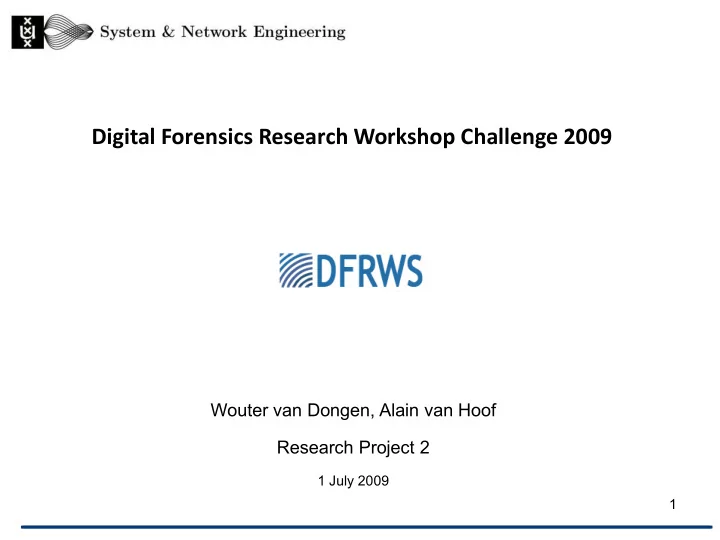

Digital Forensics Research Workshop Challenge 2009 Wouter van Dongen, Alain van Hoof Research Project 2 1 July 2009 1
Research project 2 • Introduction • Challenge details • Research questions • Method • Time zones and Linux time stamps • SSH traces • Recovery of deleted files • The big picture • Questions 2
Challenge details 3
Research questions 1. What relevant user activity can be reconstructed from the available forensic data and what does it show? 2. Is there evidence of inappropriate or suspicious activity on the system? 3. Is there evidence of collaboration with an outside party? If so, what can be determined about the identity of the outside party? How was any collaboration conducted? 4. Is there evidence that illicit data (specifically, Mardi Gras images) was exchanged? If so, what can be determined about that data and the manner of transfer? 5. What data (if any) was provided by the Johns Hopkins PS3? 6. The suspect claims that he was not responsible for any transfer of data. What evidence do you have to show that remote, unauthorized access to the system might have occurred, and does this evidence exonerate the suspect? 4
Method (1) • Standard Linux commands on read-only mounted images • Additional Linux utilities • Restored images on Playstation 3 to observe and test behaviour • Aftertime to parse and export 100,000 log entries of both systems • Excel to quickly filter and search • Created timeline 5
Method (2) 6
Timezones • 1 hour time difference • Summertime: 8th of March • Aftertime 7
Linux time stamps (1) • Modified, Access and Change time stamps, crucial for investigation. • Mount options affect behaviour, not mentioned in literature! • relatime • noatime • nodiratime • /etc/fstab 8
Linux time stamps (2) Determining the mount options using time stamps 9
Linux time stamps (3) Determining the mount options using time stamps 10
11
Investigation - Recovery of deleted files (1) • ext3 zeros out block pointer on deletion • Journaling: inode (entire block!) update is first recorded in journal 12
Investigation - Recovery of deleted files (2) Carving is not always possible journal based recovery • Search for deleted files and their inode address in directory entries 505479 (16) Recipes 503339 (16) .lesshst 503412 (2688) memdump-powerpc.tar <505465> (2660) .ICEauthority-n <505482> (20) andromachi <505483> (2604) bateman's <505484> (20) stanley's <505485> (2564) stoughton's • Find inode copies in journal 13
Investigation - Recovery of deleted files (3) No directory entries? • Search journal for old entries (e.g. with ‘ext3grep –search’) • Read all results (ext3grep --ls – block): • Try to restore inode from journal • Try restoring the inode 14
Investigation - Recovery of deleted files (4) File still not recovered? • Calculate block group data range and export the block (e.g. with dd) and try searching. Recovered: • Bash history • Drug recipes • Backdoor software 15
The big picture 16
17
Questions Questions? Thanks! 18
Recommend
More recommend